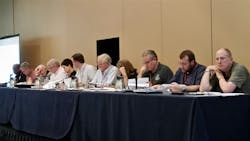Research Needs of Fire Service Reviewed
ARLINGTON, VA. -- Jury deliberations in the case of National Fire Service Research projects are now concluded, and a final ruling will be rendered early next year.
After hearing testimony Wednesday from research advocates, jurors are weighing in tp develop a road map for studies
Jurors include Curtis Brown, Nelson Bryner, John Granito, Steve Kerber, Jo-Ann Lorber, Jeffrey Merryman, Allan Rice, John Tippett, Robert Tutterow, and Michael Wieder.
"We asked the fire service organizations to send us a person for the jury. I think we had a great representation," said National Fallen Firefighters' Foundation Executive Director Ron Siarnicki, adding that some also were selected from previous work in the field.
The research review, hosted by the NFFF, is held every five years.
"We asked each of the groups to review the 2011 document to determine the relevancy and to check for gaps," he explained.
Once the final document is released, researchers will use it as a guide to determine the projects of interest to the fire service. When they apply for grants to fund their studies, they can use the report to justify their work.
For two days, fire officials and researchers from across the country discussed previous work, and decided what the critical needs are.
Community Risk Reduction:
- Code adoption leads to citizen and firefighter safety
- Decision makers need to be equipped with risk management tools
- Data that examines the economic impact of firefighting, fire prevention success metrics and performance of smoke alarms
- Look at the effectiveness of fire safety messaging and behavior
Occupational Diseases:
- Understanding acute exposure
- Identify firefighters at high risk for specific cancers
- Studies involving female, minority firefighters
Wildland Firefighting:
- No longer be the understudied population
- Studies about exposures to wildland firefighters
- Examine the PPE for effectiveness
- Study the physical, emotional impact faced by wildland firefighters
Meanwhile, the panel discussing health and wellness said additional research regarding behavioral health needs to be conducted. They also suggested an in-depth review of intervention methods.
The operations group said research should be the basis for tactical and strategic decisions. They suggested a project that would evaluate changing fire dynamics based on building types and fire load.
Collecting good data is not that easy either, and officials proposed standardizing the jargon of the industry.
Nearly every panel listed the need for enhanced data as a critical issue. It's also imperative that chiefs relay the importance of information gathering to their personnel.
Dennis Compton, chair of the NFFF board of directors, lauded the participants for their hard work.
